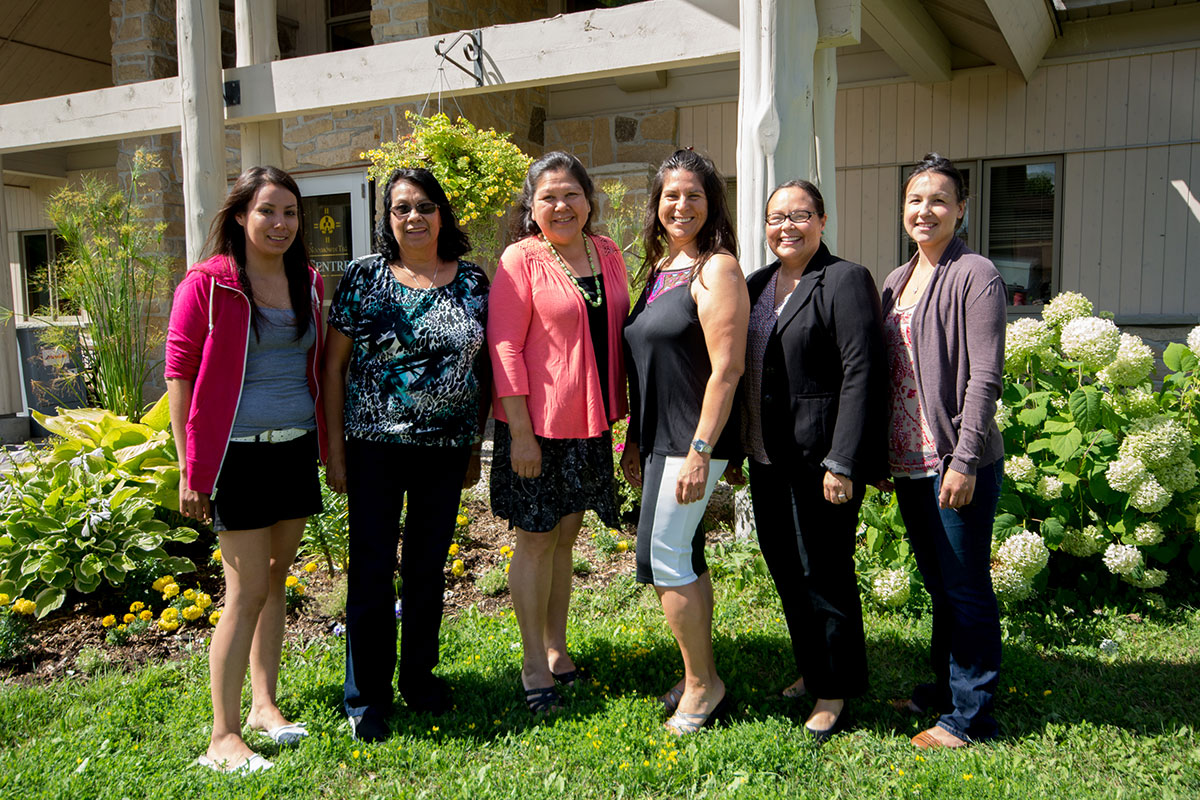Manitoulin Anishinaabek Research Review Committee
 In March 2001, Noojmowin Teg Health Access Centre sponsored a community-based health research conference to provide a forum for community members to discuss their experience with health research on Manitoulin Island. Participants brainstormed about what makes research ethical from a First Nations perspective and how the goal of ethical research could be realized and thus created a vision for health research.
In March 2001, Noojmowin Teg Health Access Centre sponsored a community-based health research conference to provide a forum for community members to discuss their experience with health research on Manitoulin Island. Participants brainstormed about what makes research ethical from a First Nations perspective and how the goal of ethical research could be realized and thus created a vision for health research.
The Manitoulin Anishinaabek Research Review Committee was established as a result of that vision in collaboration with Noojmowin Teg Health Centre, Mnaamodzawin Health Services, M'Chigeeng Health Services, Wikwemikong Health Centre and the Kenjgewin Teg Educational Institute. The Committee worked in consultation with local First Nation leadership, community members and Elders as well as community-based researchers to develop the Guidelines for Ethical Aboriginal Research (GEAR).
The GEAR can be used as a screening tool to help communities decide if a research project is ethical. The Research Review Committee will evaluate research proposals on the basis of two interrelated guiding principles: determining whether a proposed research project respects Aboriginal customs and culture in the Manitoulin area and determining if the research project reflects the vision for culturally appropriate research on Manitoulin.
In Canada, all health research at universities and their affiliated institutions and colleges are subject to review to ensure ethical conduct of researchers and to protect the well-being of participants. However, ethics are closely tied to culture, and it is important to acknowledge First Nations values in research. The review process developed by the Manitoulin Anishinaabek Research Review Committee is unique, because it adheres to the Tri-Council Policy Statement while also incorporating First Nations values.
What can communities and researchers expect from the Manitoulin Anishinaabek Research Review Committee?
An ethics review is a service to First Nation communities on Manitoulin Island and Aboriginal organizations to provide information on making a decision on whether to participate in proposed research projects and to help in the planning and implementation of research projects. The MARRCs role is, therefore, to review proposals and to provide recommendations to the researchers, First Nation communities and/or Aboriginal organizations. Although the MARRC reviews research proposals as a service to the First Nation communities and Aboriginal organizations on Manitoulin Island, we are not responsible for the actions of the researchers during the research project.
Researchers will be asked to provide the MARRC with a completed Application for Research Ethics Review. The principal investigator is also asked to forward their current curriculum vitae (cv).
An Ethics Review Sub-committee will provide an ethics review of submitted applications, based on local Aboriginal ethics as well as guidelines set by the Tri-Council Policy Statement. Once the review is completed the researcher will be provided with a form that includes any recommendations, questions or comments.
Every effort will be made to conduct the review within eight weeks of receipt of the Ethics Application Form. Results of the ethics review will be communicated back to the lead researcher and any community partners.
Important notes:
1) The review is an evaluation of research ethics as presented in the research proposal. It is not a guarantee or an endorsement of the proposed research. The committee respects the autonomy of communities and individuals to make the final decision regarding their willingness to participate in research projects.
2) In order to assist with administrative costs for the MARRC a fee will be charged to conduct an ethics review (contingent upon funding approval for the research proposal). The fees charged to a research proponent for an ethics review shall be as follows:
• projects under $5,000 shall be charged $300;
• projects between $5,001 to $10,000 shall be charged $500;
• projects between $10,001 to $20,000 shall be charged $1,000; and
• projects above $20,000 and $50,000 shall be charged 5% of the total research project costs; and
• projects above $50,000 shall be charged $2,500.
3) Reporting process
Within 6 months of completion of a research project, a report on the completed research project should be submitted to the MARRC. The one page report shall include information on the following:
• completion date of the study;
• the number of research participants;
• whether any problems were encountered during the course of the research (such as participants leaving the study);
• description about how Aboriginal knowledge, involvement of the Elders, use of Seven Grandfather teachings, and/or Aboriginal research ethics was incorporated, as well as lessons learned; and
• a narrative report with a summary of the results, outcomes, impacts, and lessons learned.
The committee has recently updated our ![]() Ethics Application Form.
Ethics Application Form.
Forms can be submitted by email to: michaelann.maclean@noojmowin-teg.ca.